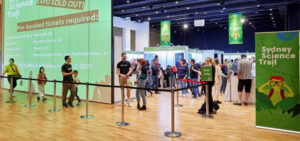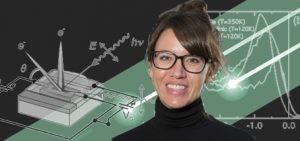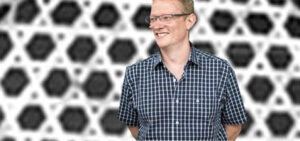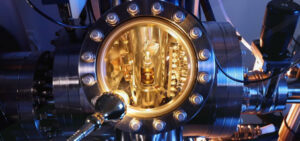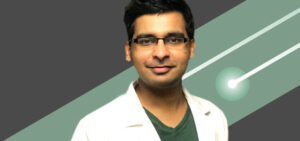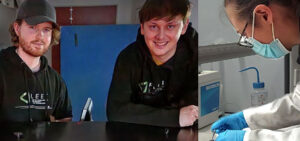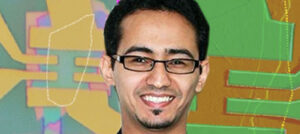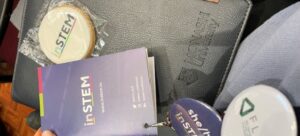Collaborate
Subscription confirmed
 WELCOME TO FLEET NEWS with regular updates from the Australian Research Council Centre of Excellence in Future Low-Energy Electronics Technologies.
WELCOME TO FLEET NEWS with regular updates from the Australian Research Council Centre of Excellence in Future Low-Energy Electronics Technologies.
Each edition of FLEET News brings a selection of research news from around the Centre, a wrap-up of FLEET stories in the media, outreach, and other news regarding FLEET researchers and research.
Catch up on past issues of FLEET News.
Michael Fuhrer
Director, FLEET
ARC Centre of Excellence in Future Low-Energy Electronics Technologies
Following the news
 If you’re on Facebook, Twitter or Linkedin, you can follow our accounts to stay up to date with FLEET news and events. You can also follow news and events at FLEET.org.au.
If you’re on Facebook, Twitter or Linkedin, you can follow our accounts to stay up to date with FLEET news and events. You can also follow news and events at FLEET.org.au.
If a friend or colleague might be interested in our news, send them this link. Or let us know and we’ll invite them.
The challenge
 The big challenge that FLEET is addressing is the increasing energy load of computation, which is currently at least 5% of world electricity use, and doubling each decade.
The big challenge that FLEET is addressing is the increasing energy load of computation, which is currently at least 5% of world electricity use, and doubling each decade.
To date, the amount of energy being burned by computing has been kept in check by a phenomenon known as Moore’s Law, whereby the number of chips in a given area doubles every two years. But we are fast approaching a limit for Moore’s Law.
Current computing is based on semiconductor chips that each burn a tiny, tiny amount of power as they ‘switch’. FLEET will develop switches that will burn almost zero energy, operating at room temperature.
Our research
FLEET will use new concepts for electronic conduction without resistance to create a new generation of ultra-low energy electronics.
We will develop materials in which electricity can flow with minimal resistance and dissipation of heat, and devices in which that electric current can be switched on and off.
FLEET’s three Research Themes are:
- Topological materials (led by Alex Hamilton, UNSW)
- Exciton superfluids (Elena Ostrovskaya, ANU)
- Light-transformed materials (Kris Helmerson, Monash)
And this research is underpinned by two Technology themes:
- Fabrication of atomically thin materials (Xiaolin Wang, University of Wollongong)
- Nanodevice fabrication (Lan Wang, RMIT)
About FLEET

With over $40M investment from the ARC (Australian Research Council) and contributing organisations, FLEET will make a significant global impact in the electronics and energy sectors.
Headquartered at Monash University, and an ARC Centre of Excellence, FLEET has 19 chief investigators at seven Australian institutions, 17 partner investigators at 13 institutions worldwide, and will have over 100 higher-degree research students and postdoctoral fellows.
The highly interdisciplinary team includes some of Australia’s best researchers in atomic physics, condensed matter physics, materials science, electronics, nanofabrication and atomically thin materials.
By building strategic and strong partnerships with Australian and international industry, research institutions and government, FLEET will build capacity for advanced electronics research in Australia and train the workforce for the next generation of electronic materials researchers and future semiconductor industry.
Recent news
More than 1000 high-school and primary students, and another 1100 members of the public were introduced to FLEET’s research and the counterintuitive world of quantum physics at Sydney Science Trail in July, in FLEET’s largest post-pandemic outreach event to date. FLEET UNSW members were among the 20+ science orgs presenting at Sydney Science Trail, based at Australian Museum as part …
FLEET welcomes four new research fellows, working in disparate roles across the Centre and all contributing to the improved diversity that makes the Centre greater than the sum of its parts: Dr Emma Laird (UQ) Dr Yonatan Ashlea Alava (UNSW) Dr Mengting Zhao (Monash) Dr Grace Causer (Monash) The four new fellows were successful candidates among 35 applicants for the …
FLEET has made the following submission towards a review of Australia’s ‘critical technologies’, ie current and emerging technologies critical for Australia today (or could become critical within the next 10 years), aimed at giving Australia a clear competitive advantage, accelerating productivity growth, and creating well-paying jobs. The ARC Centre of Excellence in Future Low-Energy Electronics Technologies (FLEET; FLEET.org.au) is a collaboration between …
FLEET has joined forces with two other ARC Centres of Excellence, Exciton Science and Ozgrav, at the 2022 Australian Science Teacher Conference (CONASTA) to engage primary and secondary educators about their research and educational resources. FLEET’s Senior Outreach Coordinator Jason Major conducted a professional development workshop at the event that informed and provided primary-early secondary teachers with the confidence to …
Congratulations to FLEET’s Jesper Levinsen, whose work has been recognised by the Monash University Faculty of Science, as he is promoted to Associate Professor. FLEET Associate Investigator Jesper Levinsen is a theoretical physicist researching strongly-interacting quantum systems at the interface between condensed matter physics and the physics of ultracold atomic gases in the Monash School of Physics and Astronomy. “I …
Congratulations to FLEET’s Dr Julie Karel (Monash), receiving a Victorian 2022 Young Tall Poppy Science Award, recognising her research in functional amorphous materials for future ultra-low energy electronics, and in science outreach. The Young Tall Poppy awards, an initiative of the Australian Institute of Policy and Science, recognise excellence in research as well as enthusiasm for communicating science beyond the …
Kagome metals: From Japanese basket to next generation electronic devices FLEET AI Dr Mark Edmonds received an ARC Future Fellowship in this week’s announcement by the Minister. The new ARC Fellowship will support Mark’s work investigating a new type of 2D material that is very promising for faster, more energy-efficient future electronic devices. ‘Kagome’ metals have a topological non-trivial nature …
FLEET Translation Program funding to automate the ‘boring parts’ of STM experiments, freeing up operators’ time Monash PhD candidate Julian Ceddia has been awarded funding from the first round of the FLEET Translation Program to further develop the automation of Scanning Tunnelling Microscopes (STMs), based on previous work from the group of his supervisor, Agustin Schiffrin. STMs are capable of …
FLEET is very pleased to report that Centre AI, Sumeet Walia at RMIT has been nominated by the FLEET Executive Committee to chair our Industry Relations Committee from Aug 2022, and has agreed to take on the position. The Centre Exec and Ops Team would like to thank Torben Daeneke for his leadership in the past two years as Chair …
First project approved for FLEET Translation Program funding PhD candidates Mitch Conway, Abby Goff, and Jack Muir have recently been awarded $31,000 in FLEET’s first round of funding from the FLEET Translation Program (FTP). Their cross-node collaboration between Swinburne and RMIT aims to create a catalogue of high quality 2D materials, namely transition metal dichalcogenides (TMDs) and their heterostructures. …
Congratulations to FLEET CI Nikhil Medhekar at Monash University, who has been promoted to full Professor of Materials Science and Engineering. Nikhil’s Computational Materials Lab at Monash University Faculty of Engineering Department of Materials Science and Engineering investigates the physics and mechanics of nanoscale materials for optoelectronic, energy and structural applications using a broad range of computational tools, including: First principles …
Over 200 in-person audience members and more than 400 online contestants competed in this month’s National Science Quiz, co-presented by FLEET with a collaboration of nine research organisations. Return host ABC TV and radio presenter Charlie Pickering, who has hosted each NSQ since the inaugural edition in 2017, chaired two competing teams, comprising: Astrophysicist Kirsten Banks (UNSW) Meteorologist Nate Byrne …
Electrical control of exchange bias effect in FePS3-Fe5GeTe2 van der Waals heterostructures via proton intercalations A RMIT-led international collaboration published this week has observed, for the first time, electric gate-controlled exchange-bias effect in van der Waals (vdW) heterostructures, offering a promising platform for future energy-efficient, beyond-CMOS electronics. The exchange-bias (EB) effect, which originates from interlayer magnetic coupling, has played a …
FLEET early career researchers and students are taking charge of their professional training and development. For the 2022 FLEET Annual Workshop this month in Wollongong, the working group delivered a range of research development training sessions and created opportunities for their peers to think about future career prospects. FLEET2022 ECR development delivered following the Centre’s three-day annual workshop included: The …
The inSTEM conference held in Brisbane 20-21 July, was a networking and career-development conference for people from marginalised or underrepresented groups in STEM, and their allies. The 2022 inSTEM was a partnership of ARC Centres of Excellence, industry transformation training centre and Australian Defence, recognising the wide recognition of improving diversity to research organisations in Australia. “I felt empowered by …

